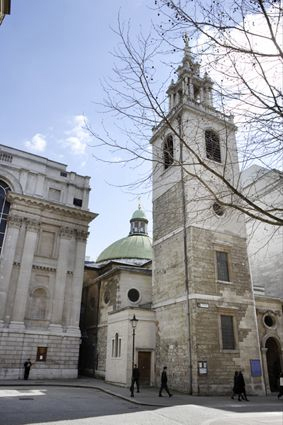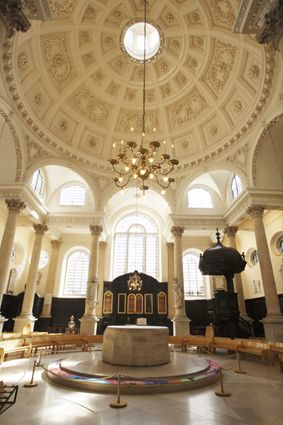 |
||||||||||
 |
||||||||||
|
1428: St Stephen Walbrook, London Mystery Worshipper: Bishop of Stortford. The church: St Stephen Walbrook, London. Denomination: Church of England. The building: A magnificent Wren church which has been described as one of the 10 most important buildings in England. The church is so closely surrounded by other buildings that you don't realise its size until you enter. In fact, it looks a little rough from the outside, but the inside, basically square with a central dome, is rich with memorials and beautifully decorated. The altar, by Henry Moore, is a colossal piece of stone, about a metre high and more than two metres deep, sitting directly below the dome. It is surrounded by curved pews on four sides. The church: This is not primarily a residential area (although some people do make their home in the City of London) and so there are no parishioners per se. The congregation is drawn from office workers on their lunch breaks. For this reason there is no Sunday service – the main weekly service is at 12.45pm on Thursdays. The church's patrons are the Worshipful Company of Grocers, one of the City of London's livery companies (guilds) that dates from 1180. St Stephen's has recently set up as the Internet Church for London, with daily night prayer services available as online video. The church was also the birthplace of Samaritans, launched in 1953 by the Revd Chad Varah, Rector of St Stephens up until his retirement in 2003. Varah had long felt the need for a counselling service that people in distress could turn to. After officiating at the funeral of a 14 year old girl who had committed suicide (having begun her periods but not understanding what was happening to her body and having no one to turn to for advice), Varah knew that the time had come to take action. And so the church's telephone number, MAN-9000, became the first (and probably still the best known) telephone helpline in the United Kingdom. A glass case in the church houses the telephone on which Samaritans received its first call for help on 2 November 1953. The neighbourhood: The church is located in the heart of the City of London, the main financial district of the United Kingdom, just round the corner from the Stock Exchange. This is the historic core from which, along with the City of Westminster, modern day London grew. The cast: St Stephen's priest in charge is the Ven. Peter Delaney, Archdeacon of London. Unfortunately Archdeacon Delaney was not available on the day I visited, and I did not manage to find the name of the priest who conducted the service. The date & time: 10 May 2007, 12.45pm. What was the name of the service? Choral Eucharist (1928 Prayer Book). How full was the building? There were 10 people in the congregation and four in the choir. I think there was a warden or two lurking in the background somewhere, as someone had brewed fresh tea for the end of the service. Did anyone welcome you personally? No. There was no sign to say that there was a service today (although a sign advertised Friday's organ recital) and no attempt was made to greet me as I entered. I had to ask someone if there was a service. Was your pew comfortable? No, not really. They were modern pews, but were still just solid wooden benches. The kneelers were very comfortable, however, in spite of the fact that they were very thin. How would you describe the pre-service atmosphere? Very quiet inside the church – no one spoke to anyone. Outside there were roadworks in progress, so the sound of that was audible. What were the exact opening words of the service? The service opened with the collect for purity: "Almighty God, to whom all hearts be open, all desires known and from whom no secrets are hid " What books did the congregation use during the service? New English Hymnal – full music edition; home-produced service booklet taken from the 1928 Book of Common Prayer. Full copies of the 1928 Prayer Book were also available. Readings were from the King James Bible. What musical instruments were played? None. The choir sang a cappella. The congregation sang only one hymn, which was accompanied by the choir. Did anything distract you? The constant noise from the roadworks outside was intrusive and very distracting. The acoustics of the building, with the high dome above the priest's head, made it difficult to hear even without that intrusion. Was the worship stiff-upper-lip, happy clappy, or what? Very much stiff upper lip, old style Church of England. The 1928 Prayer Book is very similar to the 1662, so the language was quaint and the tone was very much in keeping. The priest rattled through the service in double-quick time, stopping only to allow the choir to show off their very considerable skills.  Exactly how long was the sermon? There was no sermon. Which part of the service was like being in heaven? I'd have to say the choir. There were only four of them, but they were accomplished musicians and the sound they created was quite incredible. The acoustics of the building are perfect for choral singing. The priest did tell us what the setting was, but I forget now. And which part was like being in... er... the other place? The lack of welcome before the service. I felt I had to impose myself on them, rather than being welcomed. What happened when you hung around after the service looking lost? I was quickly engaged in conversation by one of the regulars. He was very well spoken and knowledgeable, and we discussed things you would expect to discuss in the City, such as the resignation of BP's chief executive and the takeover of Reuters. How would you describe the after-service coffee? Biscuits and freshly brewed tea from a pot. It could have been ever-so-civilised, except that the milk was in a plastic bottle, the biscuits straight from the packet, and the cups were disposable. How would you feel about making this church your regular (where 10 = ecstatic, 0 = terminal)? 5 – I might actually go regularly as I'll be working in the City for a few months. Did the service make you feel glad to be a Christian? Oh yes. Eucharistic worship always makes me feel that way. What one thing will you remember about all this in seven days' time? The sheer size of that lump of stone they use for an altar. It really has to be seen to be believed. |
|
|
||||||||||||||||||||||||||||||||||||
| More Mystery Worshipper reports | |||||||||||||||||||||||||||||||||||||||
 |
|||||||||||||||||||||||||||||||||||||||






